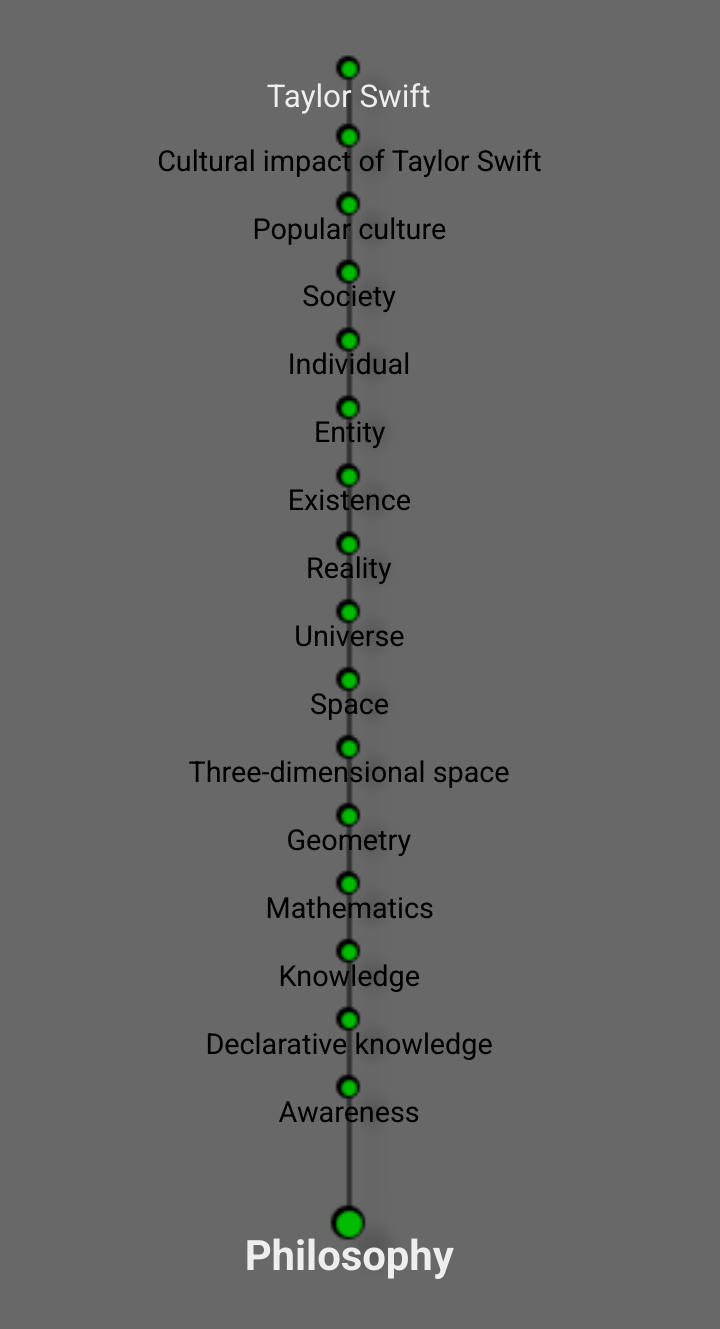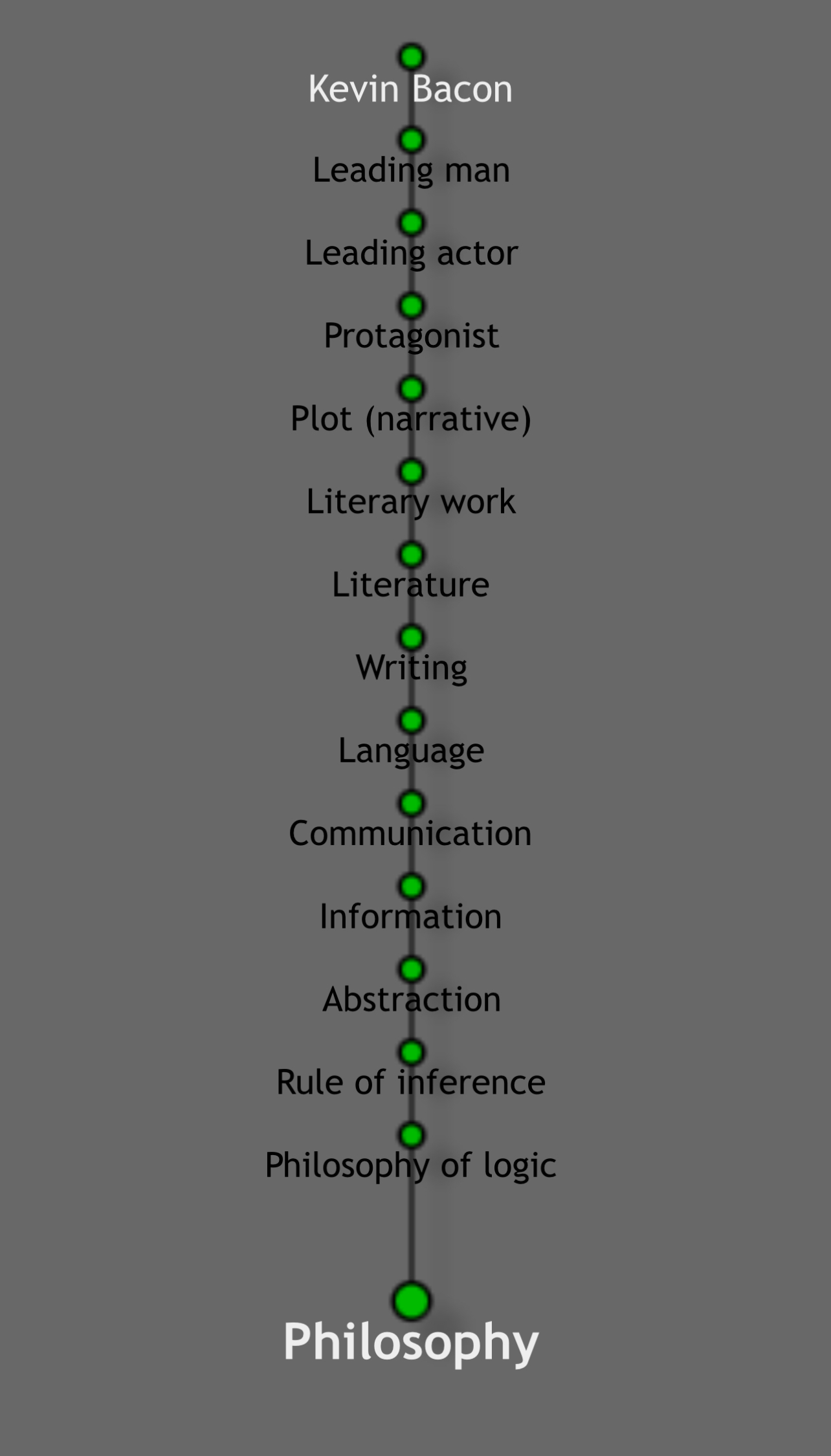it looks like you have to skip the part in italics at the top of articles (disambiguation, “other uses”, etc…) too for that to be effective
Whelp, it works on cow patties so… Confirmed?

Nice follow up game after the old “random article to Hitler“
I thought Jesus was the typical goal?
FYI: that page also gets to philosophy.
Honestly, it would be even more fun if it didn’t
Well then, another project to do, DDOS wikipedia using a crawler that checks the average and maximum amount of nodes to get to philosophy
You can also just download the article dataset :)
Something something small world networks
something something dense spanning trees


I like the idea that in order to truly understand Taylor Swift, one must first also know about math, geometry, 3D space, the concept of awareness, existence, and reality itself.
“Do you know about Taylor Swift?”
“Who?”
“Oh boy… Do you know about this thing called reality?”
But we live in a society
Bro WTF does the Wikipedia article on “Existence” say? Just “Yes”?
It’s better than nothing
A long article with 9 dropdowns… Existence is, in fact, very hard to define.
doesnt work with Bradley Cooper
Looks like BAFTA doesn’t either: https://en.m.wikipedia.org/wiki/British_Academy_of_Film_and_Television_Arts
Yeah it does
It does if you break out of the loop after the third article or so.
What the hell this is cool but kinda creepy.
I mean, it is not that creepy. Philosophy underlies science and almost everything is studied in science. I guess the same is the case for other concepts that are just as broad and fundamental. Or maybe it is possible to go from almost any page to almost any other page. I guess that would make sense too.
Yeah but remember you have to click the first link (except links between parentheses, because they are often translations).
I think it’s because, as someone earlier in the thread pointed out. Most article begin by stating what the topic is a subset of. Since everything is a result of humans categorizing and thinking about the world, that inevitably leads back to philosophy.
Yes, I agree. However, that makes it even more interesting when the categorization doesn’t lead back to philosophy, but instead goes in a loop.
I missed that. That might make a difference.
Fun fact: Since “Philosophy” is part of a loop itself, you could say the same thing about any of the 11 element of that loop, including “Three-dimensional space”
I thought the first link in philosophy was philosophy itself.
Do you mean this part? I don’t think that’s part of the article. From my understanding, the parentheses isn’t counted either.

Actually, no, but I meant something very different from what I wrote hehe I will edit my comment, thanks!
I see. I think wikipedia either forbids links to itself or at least it is against every convention
Sounds reasonable
And I think a word is never twice linked but only the first time it appears. So if “clicking” will occur a second time, it won’t be clickable
And geometry as well as the universe. That was a wild trip, I tried 5 different things.
okay wait this is actually real what
For the pages that eventually end up in loops (not to philosophy), is this kinda mathematically analogous to some of the shapes in Conway’s Game of Life?
…yes? Well, at least there’s valid definitions of “analogous” that make this true: Hypertext links form a directed graph, loops form, well, cycles in that graph, and executions of game of life can be mapped onto a directed graph, and that graph can contain cycles, just as with hyperlinks without any out-edges escaping those cycles. Executions, plural, if you only use one the graph will have only one out-edge per node and either be infinite, or have one back-edge. Rather degenerate, you’d call it a (repeating) sequence instead of a graph to not make things unnecessarily complicated.
Not very meaningful though as wikipedia articles and game of life aren’t isomorphic, at least to my knowledge. If they were isomorphic you’d actually have interesting mathematics at hand.
They’re both… terminally loopy graphs, that’s it (I just made up that term there’s probably a proper one). Also the ones “ending” in philosophy also end in a loop, it just happens to include philosophy.
Maybe. I mean, mathematically, both are Iterations. Both can converge towards a final state or get stuck in a loop (a so called attractor). But that’s about it.
Not sure what any of this means but pretty cool that you used analogous in a sentence like that
I don’t think so. Game of Life is Turing Complete, and to highly oversimplify what Turing completeness is, it basically means it can theoretically perform any computation your computer can from given instructions. So when a pattern in a Game of Life ends up in a loop, you are actually instructing it to do so, not much different than writing
while (true) {}in a computer program for example. While here, it’s just two pages ultimately linking to eachother.
Don’t let yourself be LIED to. BIG PHILOSOPHY is behind this, changing Wikipedia’s RULES so that they can CONTROL YOU through YOUR THOUGHTS. Don’t let big philosophy win, STOP THINKING.
reject thinking, revert to amphibian
Ironically enough, starting with Philosophy gets you to a loop that includes “logic”, “reason”, and a few others, but never leads back to philosophy.












